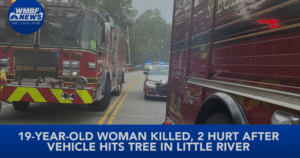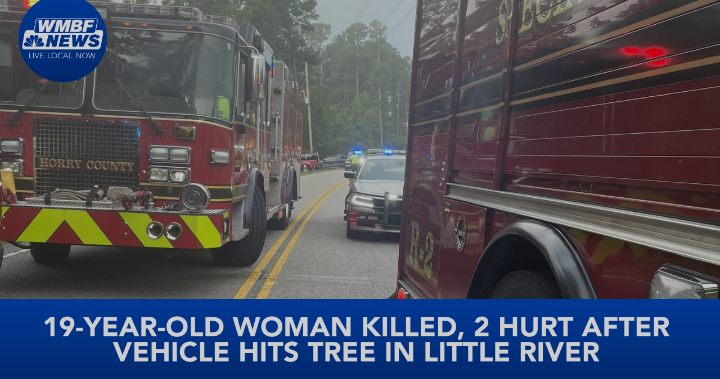Night of Shadows: Little River Man’s Final Drive Ends in Silence—Tree and Mailbox Bear Witness.

Early Sunday morning, the quiet rural stretch of Secondary 57 near Frank Gore Road in Little River became the scene of an unspeakable tragedy. At approximately 5:04 a.m., a 2015 GMC Sierra veered from the roadway, plowing into a tree and mailbox before overturning into a nearby ditch. In an instant, life was extinguished within the cold steel of the truck. The Horry County Deputy Coroner later identified the victim as 29-year-old Bradley Gore II of Little River—leaving neighbors and friends reeling in shock and sorrow .
A Community Shattered by Sudden Loss
The early dawn hours are typically serene. Few sights are more intimate than those awoken by the first blush of sunlight. But when that fragile calm is shattered by tragedy, the reverberations ripple through the heart of a community. Bradley Gore II’s name now carries a haunting echo across Little River—a town where everyone knew someone who knew him.
For his family, friends, and colleagues, Bradley was more than a statistic in a coroner’s report. He was a son, a friend, a part of the fabric of this tight-knit community. The abruptness of his passing—so unforeseen and so final—brings a grief that defies words.
The Crash Unfolded: A Moment Too Late to Stop
According to the South Carolina Highway Patrol, Bradley was alone in the GMC Sierra when it left the road to the right. In a blur of metal and motion, the vehicle collided with a tree and a roadside mailbox, then flipped and came to rest in a ditch . The exact reasons for the vehicle’s departure from the road remain under investigation—whether mechanical failure, driver fatigue, swerving to avoid an obstacle, or another unforeseen factor is yet to be determined.
In such moments, each second carries infinite weight. A misjudged turn, a momentary loss of control, or a sudden distraction can alter a life irrevocably. And in these early hours of the day, when visibility is low and alertness may be fleeting, the margins for error—and heartbreak—are thin.
Remembering Bradley: More Than a Name
While details about Bradley’s personal life were not released immediately, those who knew him speak of someone rooted in local life. Whether he was at the grocery store, on the job, or just driving through town, he carried himself with an unassuming presence that made him quietly memorable.
“He was just one of those folks who, even in a busy crowd, you’d somehow remember,” one neighbor recalls. “You’d pass him in the store, or wave as he drove by, and it felt like you were in touch. That kind of person is hard to lose.”
In the wake of his passing, local businesses and acquaintances have begun offering silent nods of remembrance—flowers left at the crash site, condolence cards pinned to community boards, and shared memories offered online and in hushed conversation.
Safety in Silent Hours: A Wake-Up Call
Bradley’s fatal accident serves as a somber reminder of the dangers that persist even in small-town life. Rural roads, often winding and poorly lit, can become treacherous. A forgotten mailbox, a loosened wheel, or groggy headlights can transform everyday travel into catastrophe.
Local officials may respond by calling for measures such as improved street lighting, clearer road signage, or speed reduction initiatives—actions that might prevent another vehicle from unwittingly drifting off course. Yet, amid the policy discussions, the human toll remains devastating—etched in the names and faces of those taken too soon.
Echoes of Other Night Drives Gone Wrong
This tragedy is not without precedent. Similar incidents across Little River’s past reveal the vulnerability of driving even in familiar territory:
In 2022, a single-vehicle collision claimed the life of 51-year-old Jason Stocks after his truck veered off Highway 111 and struck a tree .
Earlier in August 2025, 22-year-old Jimmy Bellamy from Little River was identified as the victim of a fatal wreck on Cedar Branch Road in Horry County .
Each of these incidents, like Bradley’s, starkly illustrates how rapidly life can slip away on roads where we expect safety, or at least predictability.
Grieving, Healing, and the Road Ahead
In the coming days, Bradley’s community will grapple with grief—some with tears, others through quiet remembrance. Vespers, memorial services, and shared recollections will help stitch together fragments of comfort in the wake of overwhelming loss.
Yet, for all the sorrow, Bradley’s passing may catalyze change in Little River. Local leaders may advocate for safer road design, residents may push for community awareness campaigns, and neighbors may choose slower drives with more vigilance. Every life lost carries lessons, even in the darkest tragedies.
The coroner’s office, state highway investigators, and local first responders will continue their work, hoping to understand what went wrong—and how to prevent it again. But for Bradley’s family, the questions left nagging in their hearts—why him, why now—will resist easy answers.
Final Reflections: A Town Holds Its Breath
Life in Little River will continue—morning coffee, neighborhood greetings, commutes along Secondary 57. But now, as the sun rises over the same path where Bradley Gore II drove his final miles, it shines on a community forever changed.
Because tragedies like this cast long, silent shadows over familiar roads. And in every mailbox battered, every tree scarred, there lies a story—of a person loved, lost, and remembered. Let Bradley’s story be a call to caution, a prompt to look beyond the routine of travel—and a testament to the heartbreak that can follow one moment’s misfortune.
